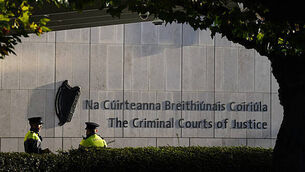Public express concern about cost of deportation flights

James Cox
Members of the public have expressed concern about the cost of deportation flights in correspondence to Minister for Justice Jim O'Callaghan.
Six deportation flights from the State via charter flight have taken place this year, with 205 people removed.
A total of 146 people have been removed from the State on charter flights.
After the latest flight, to Georgia, Mr O'Callaghan said: "I would like to reiterate that if a person’s application for international protection is refused and they are ordered to leave the State, they must do so. If they choose not to leave voluntarily, they will be forced to leave."
Messages from the public to Mr O'Callaghan, seen by BreakingNews.ie ,following a Freedom of Information request, showed public concern at the cost of the flights.
Referring to a deportation flight to Nigeria which cost a reported €325,000, one person wrote: "Given Ireland's ongoing resource constraints and the increasing pressures on public services, I believe there are more efficient and humane ways to manage deportations, particularly where individuals may be willing to leave voluntarily. I would like to propose an alternative approach aimed at reducing both the financial and operational burdens associated with forced deportations, while potentially increasing voluntary returns."
They went on to propose a number of 'reforms', including a payment of €7,000 for individuals who self-deport before a decision on their application, and €5,000 for individuals who self-deport during the appeal stage.
They also suggested a digital portal for self-deportation applications, and using the existing measures only "when necessary".
Another person urged Mr O'Callaghan to "please increase deportation flights".
In response to the email about the cost of deportation flights, Mr O'Callaghan's private secretary wrote: "It is a central priority for Minister O’Callaghan that Ireland’s immigration system is robust and rules-based. Removing people who do not have permission to remain in Ireland is undertaken through voluntary returns and deportation.
"Both types of returns are essential for the system to work effectively and to ensure that there is confidence in the application of our legislation in this area. Enforced deportation operations are complex and costly. They often involve investigations, detection, detentions in custody, legal challenges, flight costs, and confirmation with the return country that the person is their citizen.
"It is the preferred option to return people voluntarily, and the Department has a voluntary return programme to assist people to return prior to the issuance of a deportation order. In the majority of cases a voluntary return costs significantly less than an enforced deportation."
The letter also pointed to current voluntary return payments of €1,200 for individuals and from €1,000 to €2,000 for families.
Another person asked Mr O'Callaghan to "please outline what measures are being taken to significantly reduce the cost of deportations".
A letter to Mr O'Callaghan from Social Democrats TD Jen Cummins expressed concerns over child welfare when it comes to enforced deportations.
Ms Cummins wrote: "Even more disturbing are the reports that children were removed from their communities without any opportunity to emotionally prepare for the move.
"These were children who were still in school, whose academic year was not yet finished, and who were embedded in classrooms and communities. No time appears to have been given for them to say goodbye to friends, teachers, or trusted adults.
"There is no indication that any effort was made to ease the transition or offer psychological support. The experience of being removed so suddenly, without closure or explanation, can have a significant and lasting impact on a child's mental health and development.
"I am concerned that no trauma-informed planning appears to have guided this process. I would like to know whether child protection professionals, such as those from Tusla or other relevant agencies, were consulted in advance of the operation. I would also like to know what safeguards, if any, are in place to ensure that deportations involving children are carried out in a way that minimises emotional harm and respects their rights and dignity.
"In the absence of such procedures, there is a very real risk of compounding trauma in already vulnerable young people. Minister, I urge your Department to account for the decisions that led to this outcome.
"I believe a full review is necessary, not just of this flight but of the broader system under which deportations of families and children are managed. Compassion, care, and proper process must underpin every aspect of these decisions. Deportation will always be difficult, but it should never be inhumane."





